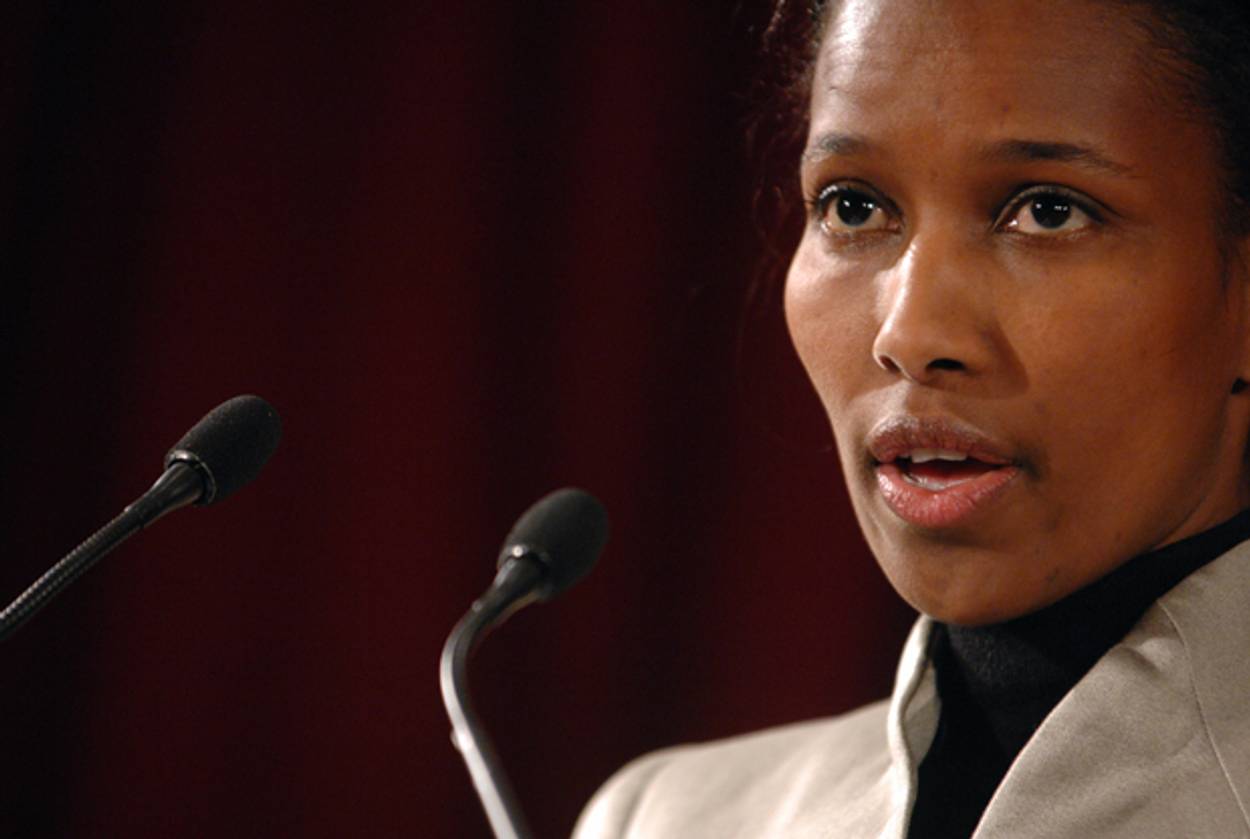Ayaan Hirsi Ali to Screen Controversial Film
Much to the chagrin of some at NYU




As the head of the Forum on Law, Culture, and Society, Thane Rosenbaum has presided over his share of loaded events. He’d chatted with Jack Kevorkian about euthanasia, discussed gay marriage with an all-star panel—including the creators of the television show Will & Grace—and spoke with Larry Flynt about porn; no one considered any of it particularly controversial, even though the forum’s previous host was Fordham University, famously run by Jesuit priests. But try hosting Ayaan Hirsi Ali, the outspoken critic of Islam, at a liberal university, and things will not go as smoothly.
This evening, Rosenbaum will moderate a panel featuring Hirsi Ali and Wall Street Journal columnist Bret Stephens. The discussion will follow a screening of Hirsi Ali’s short film Submission, which she created together with the Dutch filmmaker Theo Van Gogh. The latter, famously, had paid for the film with his life, having been assassinated by a young enraged Muslim in Amsterdam in 2004; a decade later, Van Gogh and Hirsi Ali’s work is just as capable of provoking rage, this time at New York University.
The venerable academic institution has become home to Rosenbaum’s forum this summer, which means that it is now the home of the forum’s film festival, an ambitious series of film screenings followed by discussions with high profile guests. The first installment, featuring the film Camp X-Ray, strongly critical of the American military prison in Guantanamo Bay, went off without a hitch. But when the forum announced its future installments, a group of NYU students and faculty members sprung into action. Why, they demanded, was a screening of Zero Dark Thirty being followed by a discussion with former Attorney General Michael Mukasey and former NYPD commissioner Raymond Kelly? Why weren’t there any voices on the panel critical of waterboarding, a technique featured prominently in the movie? The question baffled Rosenbaum. Previous screenings, he argued, focused on similarly sensitive questions, and each explored the argument made by the filmmakers. And no one made much of a fuss when the film being screened questioned America’s best-known military prison. The point of the screenings, he said, wasn’t to create a perfect balance between two opposing points of view; the point was to follow the art. That might’ve worked with a film denouncing American military tactics, but not in one defending them; recently, it was announced that NYU’s Faiza Patel, a prominent legal scholar critical of counterterrorism measures’ violations of human rights, will join Mukasey and Kelly in the discussion this weekend.
Hirsi Ali, however, was apparently beyond balance. She, read a letter to NYU’s president and the law school’s dean signed by students and faculty members (although none who teach at the law school), was “notorious for her extreme generalizations and hateful rhetoric about Muslims,” comments that “lack academic value and amount to little more than hate speech against a vulnerable minority community. Ali’s history has convinced other institutions to reconsider dignifying her presence. Nonetheless, the forum is hosting her as she presents a short film directed by Theo Van Gogh, a Dutch ultranationalist, which conveys to the audience that Muslim culture is fundamentally responsible for the unequal treatment of women in many Muslim-majority societies.”
In response to the letter, said an NYU law school spokesperson Michael Orey, “we did ask FOLCS Director Thane Rosenbaum if he wanted to add someone with a different perspective to the post-screening panel; he chose not to.”
This, Rosenbaum said in an email reply, was because the forum was not about hosting fighting on stage, but rather about “raising and discussing important ideas that are part of our society and are often transformed into art.” This should be obvious to an academic community dedicated to the free and unfettered pursuit of ideas. Many of Rosenbaum’s colleagues at NYU do not share this view: some of them, presumably, will join in on the anti-Hirsi Ali demonstration slated for this evening outside the 92Y, where the screening will take place. Sadly, so imperiled is academic freedom these days that too many truly important discussions can only take place outside of academia’s walls.
Previous: Tablet Gives Moses Award to Ayaan Hirsi Ali
Related: Heroine Stupor
Liel Leibovitz is editor-at-large for Tablet Magazine and a host of its weekly culture podcast Unorthodox and daily Talmud podcast Take One. He is the editor of Zionism: The Tablet Guide.